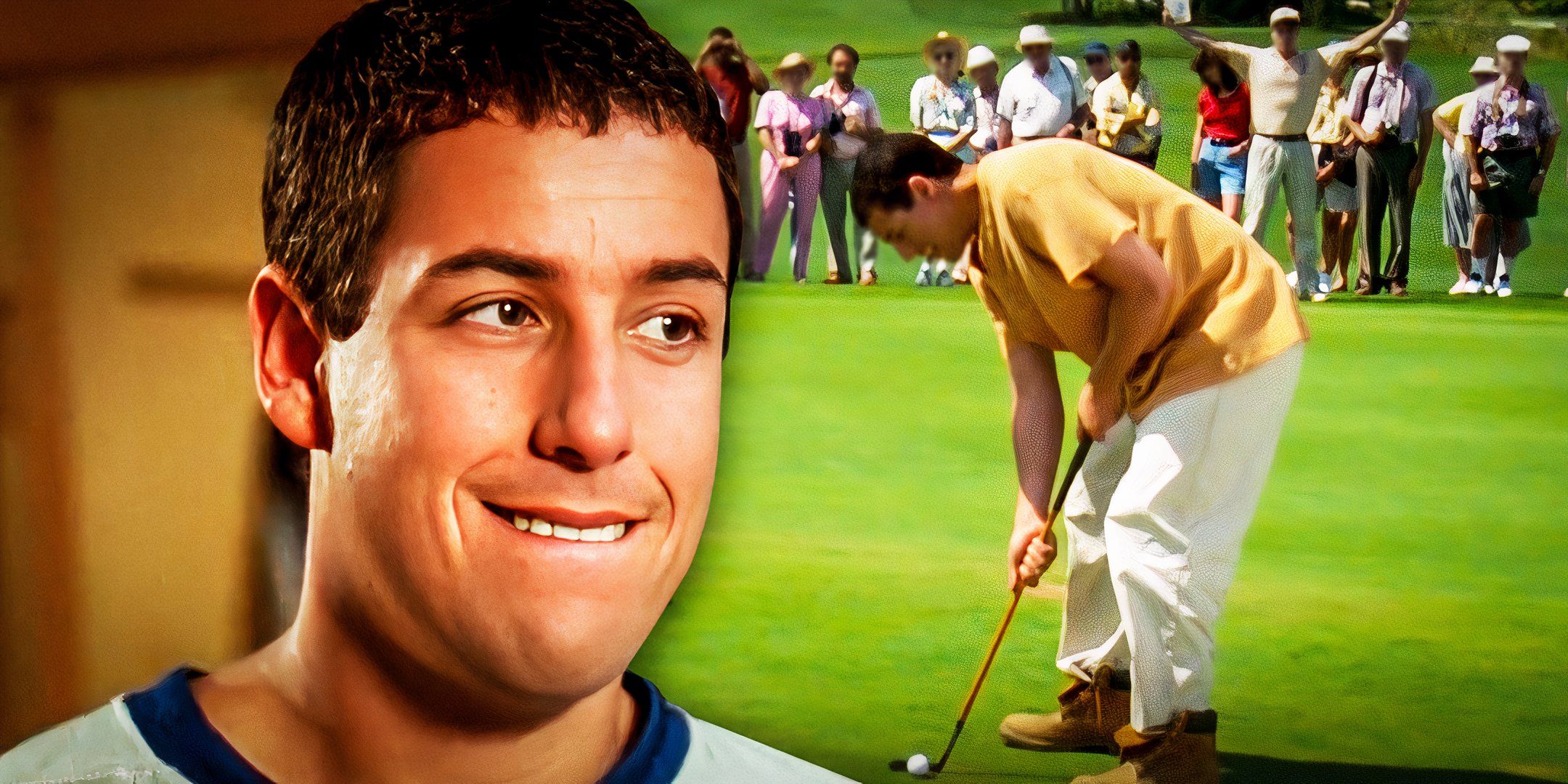In the run-up to Happy Gilmore 2‘s release, I rewatched Happy Gilmore and was happy to find it still (mostly) holds up as an entertaining, lighthearted movie. As is always the case in revisiting an older comedy, I was worried that the nostalgia I had for Happy Gilmore — based on the many watches of the film when I was younger — would make way for harsh realities that do not hold up well. Thankfully, it is still one of Adam Sandler’s best movies.
Happy Gilmore‘s story is simple enough. The film focuses on the titular character, a down-on-his-luck hockey player who is not so good at hockey. When Happy’s grandma loses her house due to tax issues, he uncovers an inherent talent for golf. Happy Gilmore‘s golf cameos thus ensue, as the foul-mouthed hero looks to cash in on his unknown talents to buy his family house back. Including some of Adam Sandler’s best movie quotes, a simple yet heartwarming story, slapstick comedy that hits more often than it misses, and an excellent antagonist, Happy Gilmore still holds up in 2025.
Happy Gilmore’s Story & Relationships Thrive On Simplicity
The Film Doesn’t Overcomplicate Itself
What immediately stood out to me upon rewatching Happy Gilmore is how simple its story really is. The idea of a hockey player being able to hit a golf ball far and becoming a professional is certainly not difficult to grasp. Although many may deem it far-fetched, the film never takes itself too seriously to make that an issue. Instead, the far-fetched nature of Happy’s journey is treated with comedy and laughs, striking a good balance that quickly becomes heartwarming.
This imbues the film with a very simple, but very endearing and relatable, sense of purpose and focus, carrying the story through its generic motions…
This heartwarming feeling often comes from the simplicity of Happy Gilmore‘s central relationships, too. Happy’s connection with his grandma is immediately laid out in the film’s opening and, even when the story delves into Happy’s golfing career, helping his grandma remains his sole motivation. This imbues the film with a very simple, but very endearing and relatable, sense of purpose and focus, carrying the story through its generic motions. Happy’s relationship with Julie Bowen’s Virginia happens very quickly and suddenly, but even the latter’s relationship with the former’s grandma makes it feel real.
Happy Gilmore also holds up well from a social and cultural perspective. There aren’t any jokes that can be considered offensive to modern audiences.
I was also pleasantly surprised by the character arc he undergoes. Happy is purposefully short-tempered at the beginning of the movie, which provides the story with a lot of comedy. This could have been grating, but the decision to weave in a storyline of self-improvement in the form of Happy controlling his violent urges gives him a nice transition.
Happy Gilmore’s Slapstick Hits More Than It Misses
The Film Is One Of The Better Sandler Comedies
As a child, I loved even Sandler’s silliest, goofiest movies. As an adult, I recognize that some of the love I had for these was unfounded, making me worry I would discover the same for Happy Gilmore. However, I was happy to realize the film’s slapstick comedy works more often than it does not. Some iconic gags that I would always quote when I was younger — like “I believe that’s Mr. Gilmore’s” or “You eat pieces of s*** for breakfast?” — still land with ease, as do many of the other humorous scenes found throughout.
The gags involving both of Happy’s golf caddies are effortlessly hilarious, as is the mid-film brawl with Bob Barker. Many other smaller moments work too, but I cannot deny that some gags are taken too far. Happy’s fight with a fake alligator is one such moment, as is the abrupt and equally silly death of Carl Weathers’ Chubbs. Chubbs’ death is understandable to add motivation to Happy’s journey, but it is far too sudden and unnecessary for the overall story.
Shooter McGavin vs. Happy Gilmore Is An All-Time Rivalry
The Antagonist Of Happy Gilmore Stands The Test Of Time
The final element I wish to praise about Happy Gilmore is Christopher McDonald’s Shooter McGavin. McGavin is, to put it bluntly, excellently unbearable in Happy Gilmore. McDonald easily embodies the annoying, grating, angering mannerisms of an egotistical sportsman who thinks himself above others, though never fails to make it hilarious too. The first half of the movie uses Shooter as somewhat of an obstacle for Happy, but it is when their rivalry is solidified that Happy Gilmore soars.
Shooter’s constant efforts to undermine Happy — and his grandma — make it easy to root against him. I will admit, part of me wished Shooter did not have to cheat to compete with Happy in the final tournament, as it somewhat undermines their rivalry. Nonetheless, this central battle works perfectly, largely due to McDonald and Sandler’s excellent chemistry and delivery. For this reason, I cannot wait to see how their dynamic plays out three decades later in Happy Gilmore 2. Until then, however, Happy Gilmore remains a perfectly easy film to rewatch.
Happy Gilmore was re-released in theaters on April 27.

